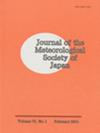ENSO对青藏高原热状况的影响
IF 1.6
4区 地球科学
Q3 METEOROLOGY & ATMOSPHERIC SCIENCES
引用次数: 15
摘要
本研究旨在探讨青藏高原(TP)热条件与El Niño和南方涛动(ENSO)的关系。1987 - 2005年11月至次年4月青藏高原雪水当量(SWE)与东赤道太平洋(EEP) 11月海温(SST)呈显著正相关。11月EEP海温与次年4月TP- swe相关最为显著,说明ENSO对TP积雪有累积效应。虽然El Niño条件可以通过在进入北非-亚洲急流时产生波列而在青藏高原上带来异常降雪,但这种影响是否会改变青藏高原的热状况仍值得怀疑。冬季SWE与TP地表温度(代表TP热状况)之间几乎没有显著的负相关关系。这表明,尽管El Niño阶段的降雪有一定的冷却作用,但TP的热条件几乎不随ENSO影响引起的异常降雪而变化。相反,前El Niño条件往往与5月TP地表温度升高有关,4月SWE与5、6月TP地表温度呈显著正相关。ENSO对TP热状态的影响可能与以往的研究有很大的不同。基于ENSO-TP热条件的关系,提出了一种合理的机理。其机制解释了ENSO对TP热状况的直接和间接影响以及季节变化在此关系中的作用。关于积雪老化和全球变暖的影响等问题也包括在该机制中。本文章由计算机程序翻译,如有差异,请以英文原文为准。
Impact of ENSO on the Thermal Condition over the Tibetan Plateau
The proposed study aims to examine the relation between the Tibetan Plateau (TP) thermal condition and El Niño and Southern Oscillation (ENSO). There were significant positive correlations between the snow water equivalent (SWE) over the TP from November to next April and sea surface temperature (SST) in the Eastern Equatorial Pacific (EEP) in November from 1987 to 2005. SST in EEP in November is most significantly cor related with the TP-SWE in next April, which suggests an accumulative effect of the ENSO on the TP snow cover. Although El Niño conditions could bring anomalous snowfall over the TP by generating a wave train en tering the North African-Asian jet, it is questionable if this impact could change the thermal condition over the TP. There was almost no significant negative correlation between the SWE and TP surface temperature (representing the TP thermal condition) in winter. This suggests that the TP thermal condition hardly varies with the anomalous snowfall caused by this ENSO impact, despite some cooling effect of snowfall during the El Niño phase. On the contrary, preceding El Niño conditions tended to be associated with increasing TP surface temperature in May and there were significant positive correlations between SWE in April and TP surface temperature in May and June. ENSO might play a part in affecting TP thermal condition in a way that is quite different from the previ ous research. A plausible mechanism based on the relation of ENSO-TP thermal condition has been proposed. The mechanism explained the direct and indirect effects of ENSO on the TP thermal condition and role that the seasonal progress can play in this relation. The issues about snow cover aging and the impact of global warming, among others, were also included in the mechanism.
求助全文
通过发布文献求助,成功后即可免费获取论文全文。
去求助
来源期刊
CiteScore
6.70
自引率
16.10%
发文量
56
审稿时长
3 months
期刊介绍:
JMSJ publishes Articles and Notes and Correspondence that report novel scientific discoveries or technical developments that advance understanding in meteorology and related sciences. The journal’s broad scope includes meteorological observations, modeling, data assimilation, analyses, global and regional climate research, satellite remote sensing, chemistry and transport, and dynamic meteorology including geophysical fluid dynamics. In particular, JMSJ welcomes papers related to Asian monsoons, climate and mesoscale models, and numerical weather forecasts. Insightful and well-structured original Review Articles that describe the advances and challenges in meteorology and related sciences are also welcome.

 求助内容:
求助内容: 应助结果提醒方式:
应助结果提醒方式:


